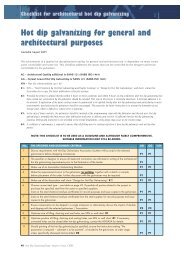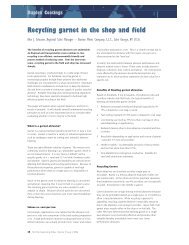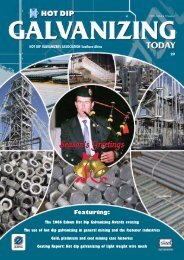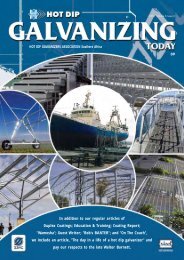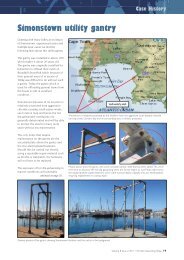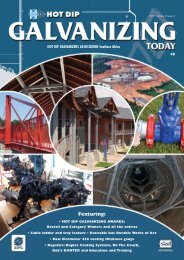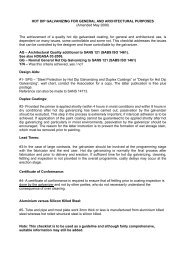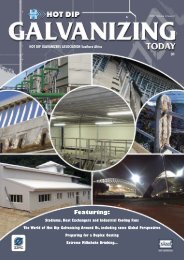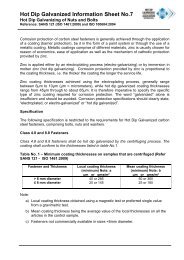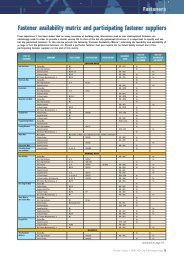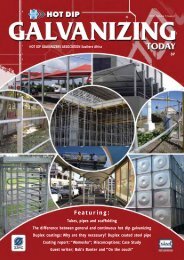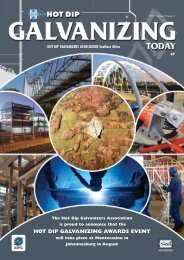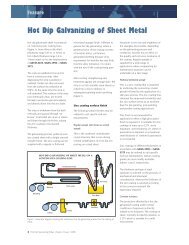HDGASA V7E1.pdf
HDGASA V7E1.pdf
HDGASA V7E1.pdf
- No tags were found...
You also want an ePaper? Increase the reach of your titles
YUMPU automatically turns print PDFs into web optimized ePapers that Google loves.
Bob’s BanterAs bacteria do, all human societiesand cultures emphasise theessential value of helping others.Most will agree that co-operation isin general advantageous, eventhough it may curb someindividuals’ freedom and personalobjectives. The benefits achieved byco-operation are generally believedto exceed those from individualselfishness. Co-operation canincrease the fitness of the cooperators,when the co-operatorstogether can collect more resourcesthan the sum of the resourcescollected by each of themindividually. The difference is thatbacteria unequivocally accept thisphilosophy and do not wastevaluable time debating it orapplying it.Unlike bacteria, businesses arenot in a position to swap theirgenes to increase their resistanceto pending disasters. What theycan do, however, is to share usefulknowledge with other companies.Many observers believe thatworldwide we are in the midst of asweeping skills and knowledgecrisis that threatens to bring to anend any form of economicexpansion. A recent survey of highgrowth companies in Americashowed that a lack of highlyskilled employees was cited as thenumber one barrier to growth by70% of the respondents. In SouthAfrica, particularly, the shortage ofskilled employees and the lack ofresources to provide skills trainingcould become the major reasonfor a stagnating or decliningeconomy. Empowerment withoutproviding for skills and knowledgeis surely meaningless.Co-operation between competingcompanies has usually beenviewed with a great deal ofsuspicion by both business andconsumers alike. Losingcompetitive advantages and thepossibility of cartels andmonopolies are seen as the majorrisks of such co-operation.Fortunately, many progressivecompanies and regulatory bodiesare looking past these apparentobstacles and beginning to seethe many benefits that cooperationcan bring. Partnershipsand alliances are gaining inpopularity as a means of providingsynergy that a small and emergingeconomy like ours needs for joband wealth creation.Unfortunately, many partnershipsand alliances exist at the'boardroom' level only. Transferringequity, joint financial ventures andoutsourcing are indeed valuableforms of co-operation. What is alsoneeded, however, is to allow theserelationships to move down tomuch 'lower' levels where relevantand practical skills and knowledgecan be shared between people fromdifferent companies andbackgrounds.The key to co-operation, both in theimmune system of bacteria and inorganisations, is the co-operativemanagement of knowledge.Appropriate knowledge has tobecome embedded in all theorganisms so that strategies to resistcommon negative influences areavailable on a broad front. Instead oftraining their own employees,companies should perhaps beinvesting in wide knowledge'networks' that enable individualsfrom similar companies to shareexpertise, exchange knowledge andlearn on demand. In this way'communities of learning' woulddevelop which, by learning how tocontinually adjust to new andchanging ideas, would benefitbusiness and the country as a whole.The Association wishes to thank BobAndrew who is a consulting value engineerand honourary member of the Associationfor his article. He can be contacted onanneve@iafrica.com orboband@mweb.co.za.The meritsof using hotdip galvanizedsteelreinforcementin concretestructuresProfessor Stephen Yeomans was invitedto South Africa during February to givepresentations countrywide on themerits of using hot dip galvanized steelreinforcement in concrete structures.Professor Yeomans was Head of theSchool of Civil Engineering of theUniversity of New South Wales at theAustralian Defence Force Academy inCanberra over the period 1993 - 2003.He recently retired from his position asAssociate Dean (Education) and ispresently a Senior Visiting Fellow in theSchool of Engineering and InformationTechnology at the University of NewSouth Wales at the Air Force DefenceAcademy. Prof. Yeomans' principalresearch interests are the corrosion ofreinforcement in concrete and inparticular the use of galvanizedreinforcement for corrosion protection.Since 1987 he has worked closely withthe International Lead Zinc ResearchOrganisation (ILZRO) and in 2004edited a compilation volume on thecurrent knowledge available ongalvanized steel reinforcement. Thisbook has become the definitiveresource on hot dip galvanized steelreinforcement. Copies can be orderedthrough the Association.The week of seminars started inJohannesburg with a morningpresentation to invited industryleaders at Robor Galvanizers onMonday 22 February. Over 25delegates attended. This was followed28 Hot Dip Galvanizing Today Volume 7 Issue 1 2010



